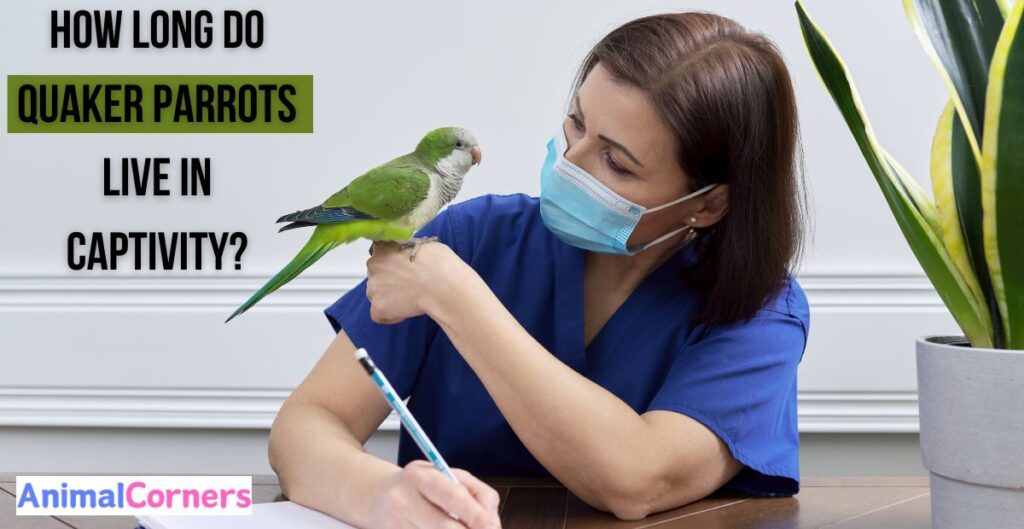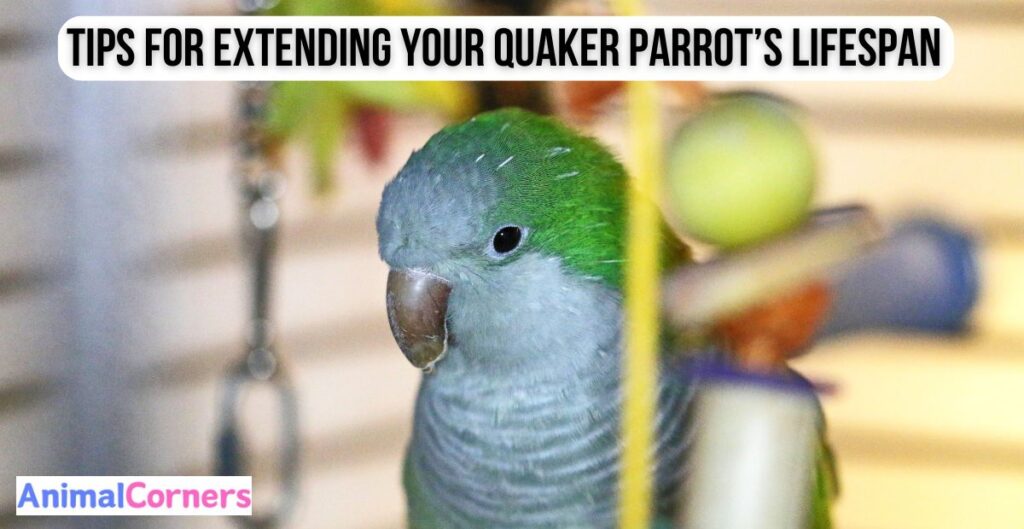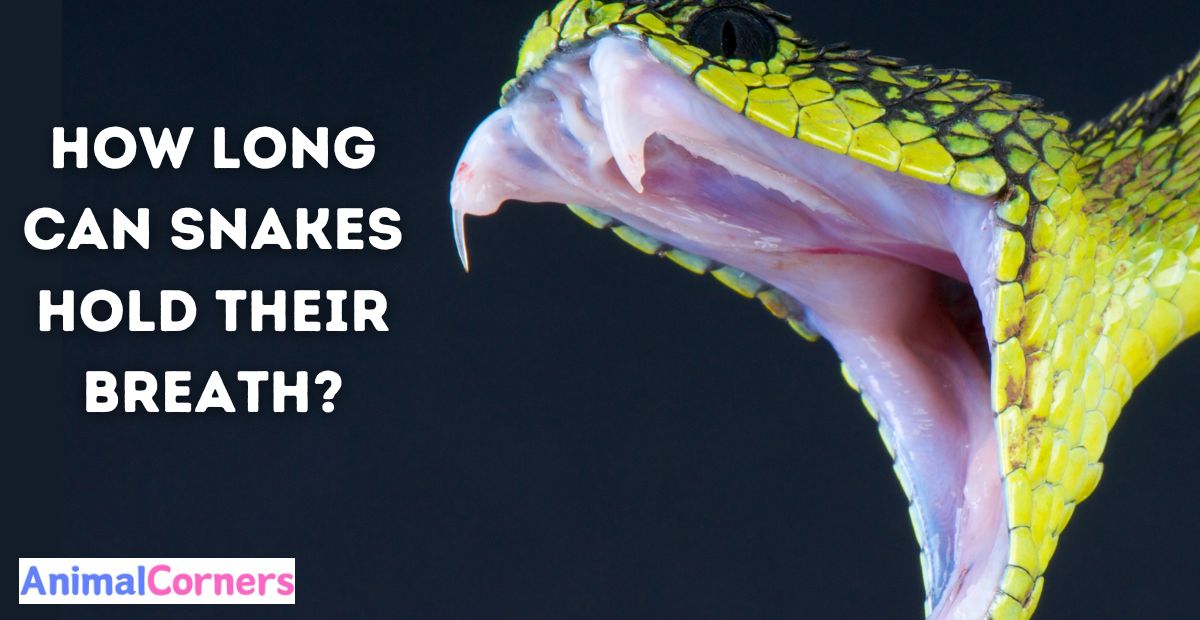How Long Does a Quaker Parrot Live?

Quaker parrots, also identified as Monk Parakeets, are small, animated-green birds with a ghostly chest and green-yellow belly. They are known for their energetic attraction and ability to mimic human speech. How Long Does a Quaker Parrot Live?.Native to South America these imitators have captivated bird fans worldwide.
Seeing the lifespan of Quaker parrots is vital for likely owners. These birds can live for 20 to 30 years if fittingly disregarded. This means that resonating a Quaker parrot into your home is a long-term capacity. Knowing how long they live helps owners plan for their care and confirms a better-off, improved life for the bird.
What is the Lifespan of Quaker Parrots in the Wild?
In the wild, Quaker parrots commonly live for all around 15 to 20 years. Their life expectancy can be more limited compared to those kept as pets, fundamentally because of different difficulties they face in their typical natural surroundings.
Factors Affecting Their Lifespan in Natural Habitats
- Predators: Wild Quaker parrots have to be on incessant alert for marauders like hawks and snakes, which can meaningfully impact their lifespan.
- Food Availability: Access to food plays a major role in their existence. During periods when food is rare, these birds may fight to find enough to eat, impacting their health and permanence.
- Weather Conditions: Harsh weather situations, such as dangerous temperatures and storms, can also threaten their existence. Respectable weather conditions are vital for their well-presence, as they can trace their aptitude to find food and housing.
How Long Do Quaker Parrots Live in Captivity?

Average Lifespan in Captivity
Quaker parrots can live more extensively than their wild counterparts when kept as pets. On average, a Quaker parrot in resistance can live for 20 to 30 years, provided they accept correct care. This longer lifespan is due to a safer environment, secure meals, and access to veterinarian care.
Comparison with the Lifespan in the Wild
Quaker parrots naturally live in the rough for about 15 to 20 years. They face numerous tasks that can condense their lives, such as predators, lack of food, and punitive weather. In contrast, life in imprisonment offers a protective and controlled setting, allowing these birds to thrive and reach their full lifespan possible.
Factors Influencing Lifespan in Captivity
Diet and Nutrition
Importance of a balanced diet: A stable diet is vital for the health and durability of Quaker parrots. It checks they get the crucial vitamins, crystals, and nutrients to keep their figures strong and their unaffected system vigorous.
Types of food that significantly impact lifespan: Providing a diversity of foods can expressively impact a Quaker parrot’s lifespan. Fresh fruits and vegetables, high-quality tablets, and casual seeds can offer a well-rounded diet. Evasion foods that are high in fat or sugar, as well as individuals toxic to birds, like chocolate or avocado, is also critical.
Housing and Environment
Appropriate cage size and design: A spacious birdcage that allows room for flight and program is energetic for a Quaker parrot’s physical well-presence.The cage should be intended with care in mind, with no sharp limits or gaps that could reason injury.
Importance of mental stimulation and exercise: Mental inspiration and regular application are imperative to prevent boredom and associated behavioral harms. Providing toys, puzzles, and opportunities for out-of-cage time can keep your parrot spiritually and bodily active.
Veterinary Care
Common health issues in Quaker parrots: Quaker parrots can face health complications such as breathing issues, feather pulling, and fatness. Being aware of these mutual matters can help in early discovery and treatment.
Frequency of vet check-ups and preventive care: Regular veterinary check-ups, preferably once a year, can help catch any health matters early. Preventive care, counting inoculations and treatments for parasites, is also vital for keeping good health.
Social Interaction
Role of social interaction in mental well-being: Quaker parrots are social beings and require communication to stay happy. Engaging with them daily through talking, playing, and exercise can foster a strong bond and recover their mood.
Effects of loneliness and isolation on lifespan: Loneliness and separation can lead to depression and behavioral matters, which can negatively influence a Quaker parrot’s lifespan. Confirming they have social communication, either with humans or other birds, is key to their long-period well-being.
Also Read:-How Fast Can a Mountain Lion Run?
Tips for Extending Your Quaker Parrot’s Lifespan

Best Practices for Diet and Nutrition
To check your Quaker parrot lives a long and healthy life, it’s important to deliver a steady diet. Offer a variety of fresh fruits and vegetables to contain hazardous vitamins and minerals.
High-quality pellets should be the main constituent of their diet, as these are especially expressed to meet their nutritious needs. Limit seeds to rare treats, as they are tall in fat. Circumvent foods that are insecure for birds, such as chocolate, avocado, and caffeine.
Recommendations for Housing and Care
Proper covering is energetic for your parrot’s well-existence. Choose a spacious cage with sufficient room for your bird to fly and move securely. Make indisputable the crate is designed safely with no shrill advantages or gaps. Clean the cage regularly to avoid any accumulation of bacteria and guarantee a healthy living environment. Additionally, deliver profusely of toys and actions to keep your parrot emotionally encouraged.
Importance of Regular Veterinary Visits
Routine vet visits are critical to protecting your Quaker parrot leftovers healthy. Schedule annual check-ups with an avian veterinarian to display your bird’s health and catch any possible problems early. Preventive care like vaccinations and parasite actions should similarly be part of their healthcare strategy. If you announcement any changes in performance or hungriness, connection your vet directly.
Tips for Ensuring Adequate Social Interaction
Quaker parrots flourish in social communication. Spend time with your parrot every day, talking, playing, and training to keep them happy. They are social individuals and can become isolated and unhappy if left alone for long periods. Consider getting another bird as a friend or confirm they receive sufficient consideration from the domestic members. Social interaction is key to their intellectual health and general longevity.
Conclusion
If you’re seeing getting a Quaker parrot, remember that they can bring a lot of joy to your life. By if the right care, you can confirm your parrot lives a long, healthy, and happy life. Pay care to their diet, housing, health, and the time you spend with them. With love and proper care, you can make sure your Quaker parrot thrives and develops a wonderful friend.
FAQs
How long do Quaker parrots live in captivity?
Quaker parrots can live up to 30 years in incarceration with proper care. Their lifespan is expressively lengthy compared to their rough counterparts, who naturally live for 15 to 20 years.
What should I feed my Quaker parrot for a balanced diet?
A steady eating regimen for a Quaker parrot covers new products of the soil, great tablets, and chance seeds. It’s vital to avoid food sources that are high in fat or sugar, as well as harmful food varieties like chocolate, avocado, and caffeine.
How often should I take my Quaker parrot to the vet?
You should income your Quaker parrot to an avian veterinarian at minimum once a year for a check-up. Steady veterinary visits support detect any likely health subjects originally and safeguard protective care such as vaccinations and parasite activities.
What kind of cage is best for a Quaker parrot?
A roomy cage that provides room for flight and drive is best for a Quaker parrot. The cage should be envisioned securely with no sharp bounds or gaps and must be cleaned typically to maintain a healthy situation.
How can I ensure my Quaker parrot gets enough social interaction?
Spend time with your Quaker parrot daily, attractive in activities like talking, playing, and training. If probable, reflect on receiving an extra bird as a friend to provide additional social communication. Social appointments are energetic for their mental well-being and overall perpetuity.





